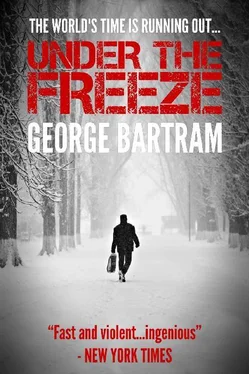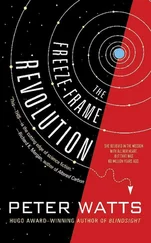Buena Ventura had been middle class long ago, and then it had become a slum, and then the revolution had renovated it. Now it was a slum again. The government had cleaned it up and moved in the people of another old slum, perhaps believing that a change of scene would make them good revolutionaries, and they had managed to make it just like home. The architecture could still speak of a great past, a past sometime around the Spanish-American War. Decayed posters spoke of a revolution that had tried and had then turned to more rewarding efforts. One of the posters read “Exhort your men to—” but it no longer told the women of Buena Ventura what they were to exhort their men to do. “Enlarge the—” read another. “Resist,” instructed a third. Faded pink-and-gray letters, above once noble faces that had bleached like poor photographs, warned, “Enemies of the Revolution surround us.” Tarp believed it.
The first girl approached him just after he turned the corner from the typically clean, typically spare streets of revolutionary Havana into the first of Buena Ventura’s alleys. He felt that he was moving backward in time. The litter grew deeper. There were dog droppings on the pavement. There were graffiti.
“Want to have a good time?” said a girl of fourteen. She had a bored, professional voice.
In two blocks he counted five pimps and eight girls, and he supposed that at least a few of them were police.
“Sell your watch?” a grinning youth said, pressing close to his left side and falling into step.
“Go fornicate with yourself,” Tarp said in his best Miami Spanish.
“I give you the best price in Havana.”
“I will give you a permanent pain between your legs.”
“A hundred ten pesos.”
“Go away.”
“A hundred twenty.”
“Go.”
“A hundred thirty.”
“Go.”
“My last offer, absolutely, no excrement.”
Tarp felt deft fingers lift the tail of the khaki shirt and feel for the wallet that should have been there. He caught one finger, twisted, drove the extended fingers of his right hand up under the young man’s ribs. There was a sound as if the man had been sick; his face was very white and his little mustache seemed to jump from it because it was so black. He looked angry and desperate and frightened, and Tarp felt sorry for him, even while he despised him.
“Want me to break this finger?”
“No — no! I did nothing…”
“You change money?”
“Yes — ah!”
“French money?”
“Yes.”
“I want to change some French money. You want to do business, stop trying to rob me and show me your money.”
“How much?”
“Four thousand francs.”
“I have to get that much money. That is much money. I give a good price, but I have to check.”
“Where?”
“Up that alley. Two minutes.” He nodded toward an opening ten yards ahead.
“You think I am an imbecile.”
“No!”
“You want to get your friends so you can rob me.”
“In two minutes?” He was almost screaming. Across the street, a girl who had her hair piled up like a forties movie star watched them without expression. “I need to check the price and get money, that is all. Truly! You think in Buena Ventura I would carry that much money? I swear!”
“On the Virgin’s cloak, I suppose.”
“I am a good Christian. Two minutes.”
Tarp let him go. “You had better be honest with me.”
“I swear.”
The girl sauntered across. A cat, pausing in its pursuit of a flea, sat down in the middle of the pavement to watch her. “Want to go to paradise?” the girl said.
“No money, angel.”
“Did he get it all?”
“There was none to get. How about taking me to paradise for love?”
“I save my love for Fidel.”
“And the church, I hope.”
“Are you a cop?”
“No, I am a priest. Good-bye, angel.”
He went back down the street, looked into the alley, and saw the young man with the mustache. The alley was like a canyon choked with trash, sunless, smelly. There was a chain-link fence blocking it fifty feet down, and the paper had blown up against it into a pile half as high as Tarp was tall.
Tarp walked into the alley. The brick walls were windowless; there was one doorway that had been bricked in. The only place big enough to hide a man was a buttress to his right, but the space behind it was empty.
“The money?” Tarp said.
The young man reached behind his back as if he were going to get something from a pocket, and his hand came back with a knife.
“Stupid,” Tarp said. “You did think I am an imbecile.”
“Because you are an imbecile. This is Buena Ventura, not your farm, excrement head.”
Tarp put his back against a wall. The buttress stuck out to his left now, ten feet away, partly blocking the street. There was enough space for him to see a big man there now, however — a huge man, one of the biggest he had ever seen. He had a timber in one of his enormous hands, and he carried it easily like a baseball bat, although it was three inches on its side and four feet long.
“Uncle Tonio and me are going to teach you a lesson, farmer.”
Tarp waited for the big man to come into the alley. The young one was anxious, however. He moved close, flashing the knife back and forth in front of him, and Tarp broke his arm and flung him toward the rear of the alley. Then, as the huge man came toward him, he took out the .22 and pointed it at the basketball-sized face. “Drop the tree, Uncle Tonio,” he said. The man puffed. “I’ll shoot your eyes out first. Then your cojones .” The wood thudded on the filthy pavement.
Tarp gestured with the gun. “Both of you against that wall. Strip.”
“Naked?” Tonio was almost bald. He sounded as if he had emphysema.
“Naked.”
“Are you a queer?”
“No, I am a policeman.” He flipped out the green DGI card that he had taken from the dead man on the boat.
“Holy excrement,” Uncle Tonio groaned.
“Just so. Get the little man on his feet and start stripping.”
When the young man objected that he had a broken arm, the older one slapped him and told him to mind his manners. He muttered like a scold and called him a fool and told him to look at all the trouble he had caused.
“Naked?” he said again.
“Stark naked.”
His skin was like dirty bread dough, and it enveloped great circles of fat that fell in cascades over his chest and hips. The young man, on the other hand, was painfully skinny, and together the two of them made a very sad picture.
“Put your hands against the brick wall and spread your legs.”
“What for?”
“I want to see what you are hiding, what else?”
“Holy excrement.”
Tarp went through their clothes hurriedly. He knew enough about the Cuban criminals who had been exported to Florida to know that they worked in big gangs and they were ruthless-made so, he supposed, by a ruthless Cuban police. He found another knife, several thousand pesos, and, sewn into the big man’s jacket behind a pocket, a little bundle of identification cards, presumably from stolen wallets?
“You know the penalty for selling identification, Uncle Tonio?”
“I do not sell them. They are souvenirs. Of my relatives. Did I sell them? Did you see me sell them?”
“Do you know the penalty for hoarding identification cards?”
“There is a penalty for that?”
“There is a penalty for everything. You know that.”
“They are not mine, I swear! I bought that coat used. I did not even know they were there. Truly.”
Tarp pocketed the Cuban money and the cards and kicked the clothes down the alley. He dropped some francs from the waterproof pocket on the pile.
Читать дальше












